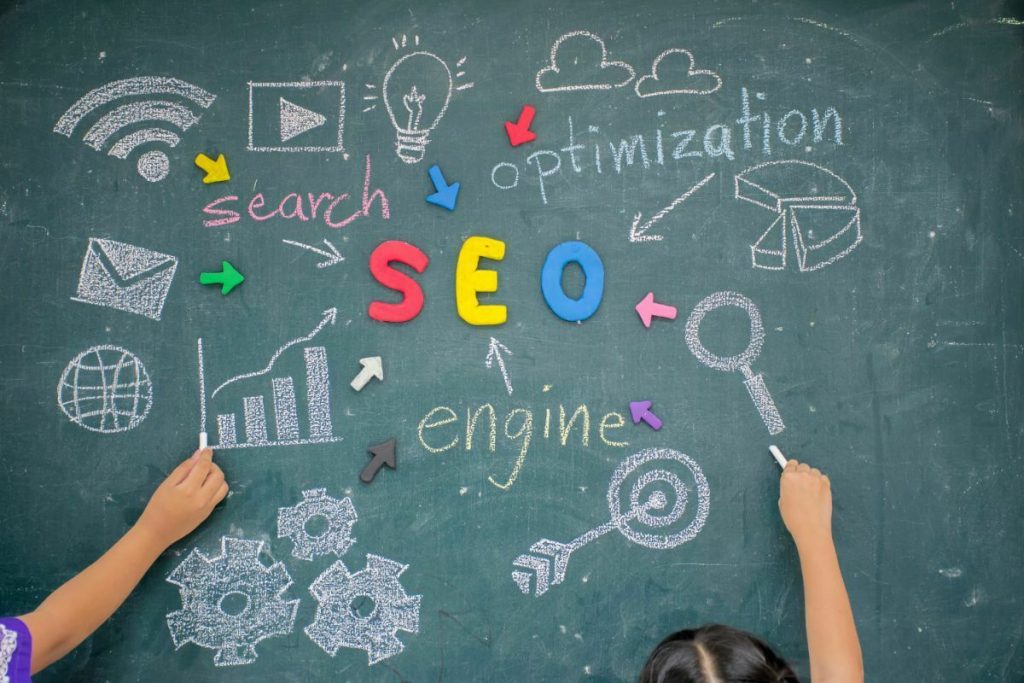SEO, meaning “Search Engine Optimisation” is a term that everyone who has a website should familiarise themselves with. But how does it work? Here are the basics. Search engines have a job to do. When people enter a query, they must offer relevant results. There may be hundreds or even thousands of results for a single search, so search engines attempt to rank them according to how useful they’ll be.
If your website comes up on the first page, you stand a good chance of being noticed. If it appears on the tenth page, you may as well be invisible, because people rarely look so far down the list. In fact, only two to three percent of people will look beyond the first page of search results.
But what is SEO?
It consists of a set of techniques that are used to move you up the search engine rankings, and if your SEO is really good, you can beat your competitors and win that coveted first-page spot.
SEO vs SEM or PPC
Instead of relying on getting a naturally high ranking in search engine results (organic ranking), you can pay to advertise your site when users enter certain search queries. That’s known as pay-per-click (PPC) advertising. It’s an accurate term because you pay every time someone clicks and visits your advertised web page.
SEO, on the other hand, sends out signals to search engines that your web page is relevant, and you don’t pay when people visit your website. The higher you rank in search, the better your chances of being seen, and the more traffic you’re likely to get.
Search engine marketing (SEM) encompasses both SEO and PPC because the aim of both approaches is to secure search engine results that drive traffic to your website. If your visitors find information that answers their questions or discover that you can solve the problem that made them enter a search engine query, you can win new customers.
How Does SEO Work?
Top hint: SEO is not about “fooling” search engines into giving you a high ranking. Instead, it’s about sending out the right signals to get your high-quality website noticed. Here are some of the basics.
Where does content come into it?
A lot of people think that SEO is all about finding and using the right keywords, but that idea only scratches the surface. Keywords do matter – but using them too much will see your site being downgraded in search engine rankings for the “crime” of keyword stuffing. It can be a tricky balance to achieve!
Search engines keep getting better at evaluating the usefulness of content. They check to ensure that it’s unique and not just a copy, and know how to look for related terms, synonyms, and readability. They actively help you to get better rankings when you offer high-quality, relevant content. That’s where it begins, but not where it ends.
Website Page Structure
Websites are written in HTML code and the way it’s used will affect how well search engines can “read” a site and rate its content. Titles, URLs, and headers are among the most important signals your website sends out. Aside from that, your entire site must be “crawlable” to help search engine algorithms understand it so that you stand a chance of ranking well.
User Behaviour
Finally, search engines will look for signs that people found your information helpful. One of the top signals of this would be that other websites link to your content, but other signals also matter. For example, when people visited your site, did they stay there or immediately “bounce” elsewhere?
Types of SEO
To find this article, you may have entered a search phrase like “What is SEO in marketing?” Search engine algorithms will already have ranked it, but its title and content only contribute to the result. There are four types of SEO to consider.
On-Page SEO
There’s more to on-page SEO than meets the eye. Apart from checking out your title tag, URL structure, and the originality and relevance of the content on a page, search engines look at several other things.
Images aren’t just eye candy. Search engines will look at their titles, file names, captions, and alt text, for example. They’ll also check out your internal links and the anchor text you chose for them – even your meta-description goes under the microscope.
Off-Page SEO (link-building)
If a high-quality website other than your own chooses to offer its readers a link to your website, it tells search engines that you have something useful to offer. Online reviews also play a role, and your Google Business Profile will get its share of search engine scrutiny as will third-party review websites like Yelp.
Finally, brand signals like people actively searching for your business by name or interacting with your company on social media tell search engines that you’re actively in business. They can “see” that people are interested in what you do, and your content gets another little boost.
Local SEO
Hoping to become a hometown hero? Ordinary SEO will help you to get attention from users in your country and even from around the world, but local SEO targets search results for people in your region.
That means paying attention to things like your Google Business Profile and local business listings. At the very least, your business’s name, address, and phone number (NAP) must be correct no matter where they appear. Meanwhile, your NAP should appear on every page of your website, making it possible for search engines to see that you’re local, and making it easy for prospective customers to get in touch.
Technical SEO
When we think about what SEO is and how it works, we must consider the user experience from a technical perspective. Sites that are slow to load, packed with technical errors, or that only display well when accessed from a PC will get downgraded rankings simply because these are all signs of a poorly put-together website. In short, if it’s frustrating to use or difficult to navigate, search engines will not rank your website among their top choices.
What is SEO Marketing?
The aim of SEO marketing is to get more customers for your business by improving your online visibility using search engine optimisation techniques. Needless to say, a lot of other businesses are trying to do the same thing, so you need a very smart, professional strategy to achieve the best results.
Activities include keyword research to find out what people are searching for and which search terms offer you the best chance of achieving a good rank. And, since your competitors are probably adopting an SEO strategy of their own, competitor analysis will be a big help. After all, you can’t beat your competitors if you don’t know who they are and what they’re doing.
Then, your entire website needs to be audited to see where there’s room for improvement. For example, are your content and images optimised; do your links work and are they logical; and is your content properly structured? Needless to say, all of this takes experience and expertise to achieve.
What Does Good SEO Do For You?
As your website starts powering its way up the search engine rankings, you get higher volumes of visitors. Your ideal customers choose your business or remember it for future reference. Other websites notice you and start linking to your content, and that brings you even more exposure and even better rankings, and all of these things ultimately translate into more customers and money in the bank.
There’s no point in having a website that is, to all intents and purposes, invisible to your target market. To get the visibility your business deserves, you need great SEO, and to get that, you need the right SEO professionals.
What would you like your website to do for you? Our London-based SEO experts can help you to achieve your goals. As one of the UK’s leading SEO agencies offering flexible 3-month SEO campaign packages starting from just £1,500/month, Yellowball are ready to help you drive more awareness, leads and sales for your website through SEO. Get in touch today.









